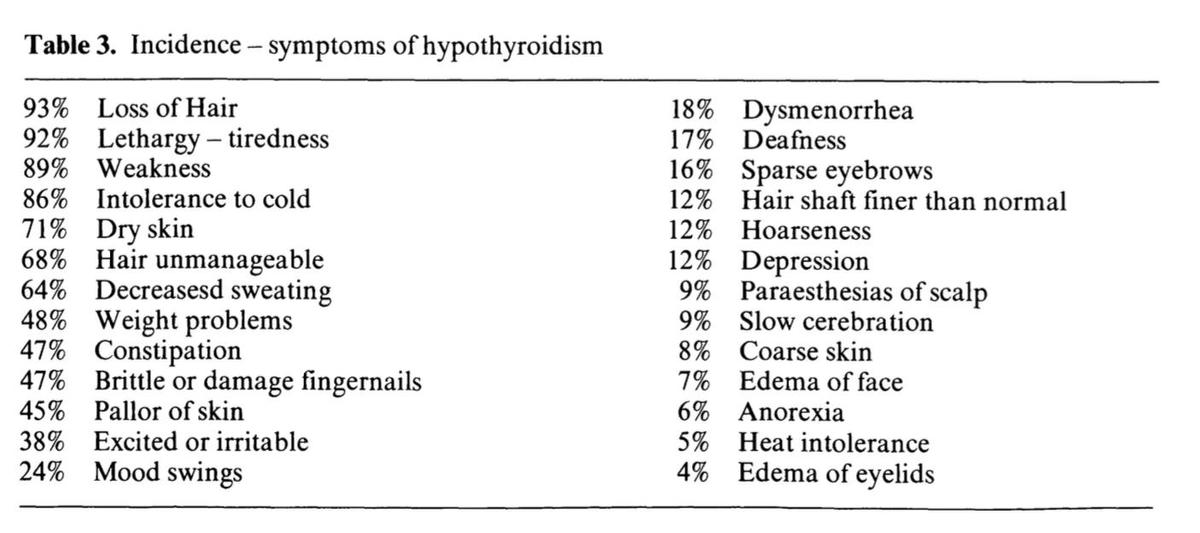Hypothyroidism
- posted: Dec. 06, 2022
Hey,
Do you know that Broda Barnes estimated that 40% of Americans have hypothyroidism in 1974? And the problem is even worse now with our population's declining health.
Hypothyroidism is extremely under-diagnosed because it's based off of the TSH level which a) has a range that is way too wide (which was created so that only 5% of the average population would test as positive for hypothyroid) and b) can be suppressed due to chronically high adrenaline making it a very inaccurate way to assess the thyroid.
The thyroid is at the center of the whole metabolism. When your thyroid is functioning properly, all of the other hormone glands that are usually activated under stressed conditions can fundamentally relax. Healing IS energy, and the thyroid controls the thermogenesis and metabolic rate of the entire organism.
Thyroid ensures that nutrients get to the cells, that the body stays in an energized yet relaxed state, that the organism is alert and creative. That's why its so critical to optimize when looking at the body holistically.
If you want to figure out if yourself or someone else is hypothyroid, use the following assessments:
*1. Basal body temperature*
This is the ultimate, most functional way to assess thyroid status, because your thyroid is in charge of heating you up. Check your underarm temperature with a regular thermometer on waking (before rising out of bed, which will artificially raise the temp) and at 1pm (when thyroid hormone is highest on average during a 24 hour circadian cycle).
The readings should be 98.0 on waking and 98.6 at 1pm. The colder you are from the ideal, the more hypothyroid you are proportionally.
*2. Symptoms*
Symptoms are a great way to assess whether you are hypothyroid, regardless of TSH status. If you have many of the following symptoms, especially with a low basal body temp, hypothyroidism is likely.

James, M.B., James, A.P.R. (1981). Prevalence of Thyroid Abnormality Associated with Hair Loss. In: Orfanos, C.E., Montagna, W., Stüttgen, G. (eds) Hair Research. Springer, Berlin, Heidelberg.
https://doi.org/10.1007/978-3-642-81650-5_57
*3. High cholesterol*
Cholesterol is highly misunderstood in the medical community. Cholesterol is protective. The reason why cholesterol plaques in the arteries is to protect/seal damage to the arterial wall.
Cholesterol is also the precursor to bile (produced by the liver to digest fats) and all of your hormones. Cholesterol rises in times of stress so that your body can produce more of the protective hormones like pregnenolone, progesterone, and DHEA. Thyroid converts cholesterol into the various hormones. That's why high cholesterol isn't bad in and of itself. It's just a sign that your thyroid is under-active and not converting it. A cholesterol should be around 200 ideally.
Many people are on statins for cholesterol which are absolutely toxic. All anyone with high cholesterol needs is some thyroid and their cholesterol will drop accordingly.
*4. Prolactin and PTH *
Prolactin and PTH are not standard labs that are run for most people, but both will elevate in a hypothroid state. Prolactin is released by the pituitary and is associated with high estrogen, which inhibits thyroid. PTH is parathyroid hormone, which also antagonizes thyroid and is released when the organism is stressed. Like TSH, the ranges for these chemicals is far too wide. Ideally, prolactin will be around 5 and PTH around 20.
*5. TSH and reverse T3*
While TSH is not very useful by itself, it can provide more info in the context of the above assessments. TSH should ideally be under 1, which is far lower than the standard range which goes up to 4.5 or higher. Many people have a TSH in the high 1s or 2s, which most doctors would completely overlook but is still indicative of hypothyroidism.
To make matters more confusing, someone can be seriously hypothyroid even with a TSH under 1. That's because adrenal hormones will suppress TSH. Adrenaline can make someone hyped and anxious, which is also a classic sign of hyperthyroid. Many people with a low TSH that are on edgy are misdiagnosed as hyperthyroid when they are really hyper-adrenal. That's why the basal body temperature readings, symptoms, and cholesterol are so important to evaluate to provide context.
Reverse T3 is indicative of cortisol which suppresses thyroid as well, so a high reverse T3 can also add more information to the picture.
Hope that helps! Let us know if you have any questions or would like to consult about any of your specific cases or lab results.

